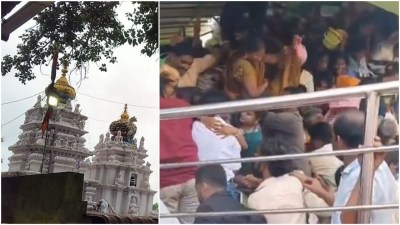As Delhi Metro reopens after 5 months, top priority: Please mind the gap
On Thursday, the DMRC unlocked the Rajiv Chowk interchange station for a demonstration of the ‘new normal’, where pre-recorded voices will advise commuters to "mind the gap" not just between the train coaches and platforms, but also among themselves.
 Staff sanitise Metro coaches at Rajiv Chowk station Thursday. (Express photo/Tashi Tobgyal)
Staff sanitise Metro coaches at Rajiv Chowk station Thursday. (Express photo/Tashi Tobgyal)Forty-five auto thermal scanners, 195 hand sanitisation machines, 750 body temperature guns, 35,000 disposable masks and 1,625 PPE kits for emergency medical situations — across 285 stations spread across Delhi and NCR. Less than a week to go for the resumption of Metro services, the Delhi Metro Rail Corporation (DMRC) has started equipping stations with all devices and equipment that will greet commuters returning to the capital’s signature public transit from September 7.
On Thursday, the DMRC unlocked the Rajiv Chowk interchange station for a demonstration of the ‘new normal’, where pre-recorded voices will advise commuters to “mind the gap” not just between the train coaches and platforms, but also among themselves.
The sheer enormity of the challenge to ensure social distancing in a network that registers a footfall of over 30 lakh daily is not lost on the DMRC management, which maintains that more than bringing people back to the Metro, its focus will be on ensuring safe travel for every individual.
“Take the Rajiv Chowk station for example, which has eight entry/exit gates. The plan, for now, is to allow both entry and exit through Gate number 7. It is being done to control the flow of passengers inside the station. If, at any point, passenger count rises to an extent where social distancing becomes difficult, entry will be temporarily stopped,” said a senior DMRC official.
That, however, is going to be easier said than done in busy stations like Rajiv Chowk or Kashmere Gate or even stations passing through Noida’s office hubs, where queues of commuters spill on to streets even during regular weekdays. Metro is hoping the rush will be manageable as schools and colleges remain shut and many offices are allowing work from home.
While the Union Ministry of Housing and Urban Affairs, that has administrative control over the Metro, said that trains may skip stations reporting social distancing norm violations, DMRC officials said implementation of any such measure would be impractical.
Contrary to what the ministry announced Wednesday, the SOP drafted by it way back in May also says that trains may skip stations “if sufficient passengers are not likely to use such stations.” The same SOP has also been finalised by the DMRC.
Trains will also skip stations falling in containment zones. “Most of our stations are on main roads and containment zones are mostly concentrated in residential clusters. So, if required, we will put out a list on September 6,” the official said.
A senior DMRC official told The Indian Express that for violations, the Metro Railways (Operations and Maintenance) Act, 2002 will be invoked. As per the provisions, drunkenness, nuisance, spitting, squatting or quarreling are punishable by a fine of Rs 200 and removal from carriage.
Another clause in the Act makes “endangering safety of persons travelling by Metro railway by rash or negligent act or omission” punishable with imprisonment for a term which may extend to one year, or with fine, or with both. “No person suffering from infectious or contagious diseases as may be prescribed, shall travel by the Metro railway and any person travelling in contravention of any rule made under sub-section (1) shall be liable to be removed from the metro railway,” says another clause.
The average time spent on daily commute in Metro will also rise by at least 10 to 15 minutes due to various Covid protocols that will be in place, DMRC has said, urging people, especially office-goers, to factor in that aspect in their daily schedule.
The Metro has also equipped 50 lifts across stations that can be operated by pressing buttons using one’s foot. Some of these stations are Kashmere Gate, Rajiv Chowk, New Delhi, Central Secretariat, Hauz Khas, Mandi House, Botanical Garden and Kalkaji Mandir.
While auto thermal scanners/hand sanitisation machines will be placed across 45 stations, there will be 750 thermal screening guns spread across the remaining ones. Passengers will be barred from entering the station and sent to the nearest medical centre if they run high temperature or show flu-like symptoms.
At checking points, CISF personnel wearing masks, gloves and face shields will frisk passengers from a distance with metal detectors mounted on sticks. There are also provisions for spraying disinfectants on baggage.
Only those carrying smart cards will be allowed to walk past the fare deduction gates. At the interchange stations, trains will stop for up to one minute for boarding and alighting, while at regular stations trains will halt for at least 30 seconds.
Passengers have also been asked to avoid carrying metallic items while commuting.







